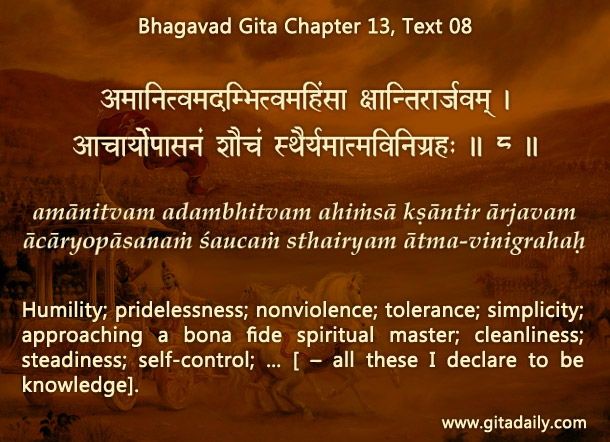Humility, which is lauded as a prime virtue in the Bhagavad-gita (13.08), is often misunderstood. One such misunderstanding centers on how it can be developed: we may believe that if we contemplate the many wrongs we have done in the past and beat ourselves up for them, we will thereby develop humility.
It’s true that contemplating our past mistakes can help counter the toxic growth of hubris, which is the opposite of humility. Hubris centers on an overestimation of ourselves, especially our talents and virtues. Our mistakes remind us forcefully that we are not as talented or as virtuous as we thought we were, thereby pricking a hole in our hubris. However, hubris is shockingly stubborn; as soon as we forget our mistakes, it rapidly resuscitates itself. To prevent its resurrection, we need to stay aware of our mistakes – or more precisely, of our limitations that those mistakes point to.
How can we stay aware of our limitations? By acknowledging, at least to ourselves, that we can’t just take up any difficult task that we want, presuming that we have the necessary ability; and that we can’t let ourselves go into any provocative situation, presuming that we have the necessary virtue to avoid getting provoked. When we thus unhesitatingly acknowledge our limitations, we make honesty the natural and sustainable foundation for our humility.
Unfortunately, instead of acknowledging our limitations, we sometimes obsess over the mistakes we committed and beat ourselves up for them. Such self-flagellation only breeds negativity: it makes us believe that we are too flawed and fallible to ever do anything worthwhile; it depletes our confidence that we can do some good, however small; it eventually destroys our will to even try to do any good. Thus, we end up becoming reservoirs and radiators of negativity.
That’s why we need to evaluate whether our contemplation on our mistakes is helping us or harming us.
One-sentence summary.
Contemplating our mistakes to stay aware of our limitations fosters humility; contemplating those mistakes to beat ourselves up breeds negativity.
Think it over:
- How can contemplating our mistakes counter hubris?
- How can we stay aware of our limitations?
- How is beating ourselves up for our mistakes counterproductive?
***
13.08: Humility; pridelessness; nonviolence; tolerance; simplicity; approaching a bona fide spiritual master; cleanliness; steadiness; self-control; … [ – all these I declare to be knowledge].
To know more about this verse, please click on the image


Leave A Comment